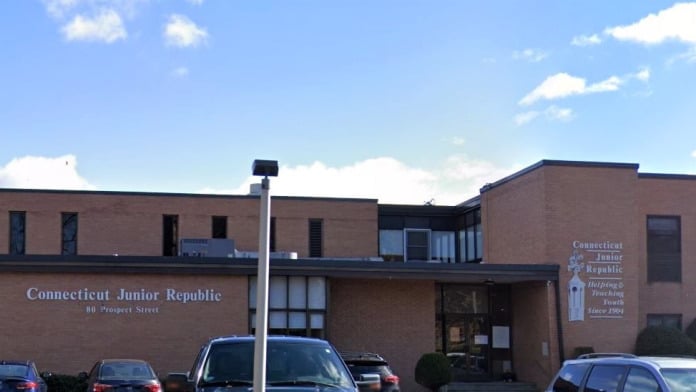About Connecticut Junior Republic
Connecticut Junior Republic is a provider of education, treatment and support for young people and their families in Waterbury, Connecticut. They help clients transform and find hope. Their programs include community and residential services for young people.
Teen Residential Program in Connecticut
They have an adolescent male intermediate residential (AMIR) program. This is designed for teens 14-18. Referrals for the residential program are made either by the Department of Children and Families or the Judicial Branch Court Support Services Division.
I like that they can deliver this program in either English or Spanish. They also offer translation services for parents who need information in another language.
This program integrates dialectical behavior therapy to encourage youth to decrease substance use, improve their emotional regulation skills, decrease delinquent behavior and improve mental health. The aim of this program is for youth to be able to return to their homes as quickly as possible. A resident may stay from 30 days up to six months, depending on their needs and progress. During their stay, teens will attend school right on the Waterbury campus.
Home-Like Residential Stays for Teens
Teens sleep in bedrooms with either a single or double bed. Each room is spacious and comfortable, and boys are encouraged to decorate their room. I like that they want each resident to feel at home during their stay.
I also appreciate that residents make daily phone calls with their family members. There’s also scheduled in-person family visits and family sessions.
Teens bring their clothing, shoes, personal items and toiletries to the residential facility. Connecticut Junior Republic takes care of the rest.
Latest Reviews
Rehab Score
Gallery


Other Forms of Payment
Private insurance refers to any kind of healthcare coverage that isn't from the state or federal government. This includes individual and family plans offered by an employer or purchased from the Insurance Marketplace. Every plan will have different requirements and out of pocket costs so be sure to get the full details before you start treatment.
Self-pay involves paying for treatment out of your own pocket. You can use savings or credit, get a personal loan, or receive help from family and friends to fund your treatment. If you don't have insurance or your insurance plan doesn't cover a specific program, self-pay can help ensure you still get the care you need.
Sliding scale payments are based on a client's income and family size. The goal is to make treatment affordable to everyone. By taking these factors into account, addiction recovery care providers help ensure that your treatment does not become a financial burden to you or your family, eliminating one barrier to care.
Medicaid is a state based program that helps lower-income individuals and families pay for healthcare. Medicaid covers addiction treatment so those enrolled can use their coverage to pay for rehab. When a program accepts Medicaid the client often pays very little or nothing out of their own pocket.
Military members, veterans, and eligible dependents have access to specific insurance programs that help them get the care they need. TRICARE and VA insurance can help you access low cost or no cost addiction and mental health treatment. Programs that accept military insurance often have targeted treatment focused on the unique challenges military members, veterans, and their families face.
Addiction Treatments
Levels of Care
Outpatient Programs (OP) are for those seeking mental rehab or drug rehab, but who also stay at home every night. The main difference between outpatient treatment (OP) and intensive outpatient treatment (IOP) lies in the amount of hours the patient spends at the facility. Most of the time an outpatient program is designed for someone who has completed an inpatient stay and is looking to continue their growth in recovery. Outpatient is not meant to be the starting point, it is commonly referred to as aftercare.
Connecticut Junior Republic offers a residential care in a homelike environment for girls referred by Juvenile Court probation officers. The program includes an initial assessment to determine the needs of the girl and her family, crisis stabilization and a comprehensive aftercare planning. The program may include community-based or in-home treatment counseling, designed to prevent another involvement with the Juvenile Justice System.
Treatments
The goal of treatment for alcoholism is abstinence. Those with poor social support, poor motivation, or psychiatric disorders tend to relapse within a few years of treatment. For these people, success is measured by longer periods of abstinence, reduced use of alcohol, better health, and improved social functioning. Recovery and Maintenance are usually based on 12 step programs and AA meetings.
Drug rehab in Connecticut provides the professional support that is often necessary to break free from drug dependency. With proper treatment, individuals can make changes that restore balance and health to their lives and achieve long-term recovery.
A combined mental health and substance abuse rehab has the staff and resources available to handle individuals with both mental health and substance abuse issues. It can be challenging to determine where a specific symptom stems from (a mental health issue or an issue related to substance abuse), so mental health and substance abuse professionals are helpful in detangling symptoms and keeping treatment on track.
Opioid rehabs specialize in supporting those recovering from opioid addiction. They treat those suffering from addiction to illegal opioids like heroin, as well as prescription drugs like oxycodone. These centers typically combine both physical as well as mental and emotional support to help stop addiction. Physical support often includes medical detox and subsequent medical support (including medication), and mental support includes in-depth therapy to address the underlying causes of addiction.
Clinical Services
According to cognitive behavioral therapy in Connecticut, individuals can change their behaviors by changing their thoughts. Applied to substance use disorder, this can be an effective treatment method to help patients transform their thoughts and lives.
Motivational interviewing in Connecticut is a method of communication designed to stimulate motivation and commitment to change. It encourages clients to move toward goals by exploring their own motivations for change rather than coercing them to change through advice, warnings, or judgment.
Trauma therapy addresses traumatic incidents from a client's past that are likely affecting their present-day experience. Trauma is often one of the primary triggers and potential causes of addiction, and can stem from child sexual abuse, domestic violence, having a parent with a mental illness, losing one or both parents at a young age, teenage or adult sexual assault, or any number of other factors. The purpose of trauma therapy is to allow a patient to process trauma and move through and past it, with the help of trained and compassionate mental health professionals.
When you use nicotine replacement therapy in Connecticut, you can avoid further exposure to the harmful chemicals found in tobacco. You'll get small doses of nicotine without the other toxins, so you can slowly wean yourself off nicotine and quit smoking for good.
Staff

Daniel W. Rezende, LCSW
President & CEO

Hedy Barton
Chief Development Officer

Katherine Budzyn
Director of Human Resources

Christine Jaffer
COO

Patricia A. Shishkov, BS
CFO
Contact Information
80 Prospect Street
Waterbury, CT 06702